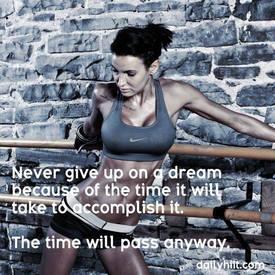We are pleased to announce that as of March 4, 2025, an updated Rich Text Editor has been introduced in the MyFitnessPal Community. To learn more about the changes, please click here. We look forward to sharing this new feature with you!
Time you eat

PurpleCupcakes01
Posts: 141
Does it matter what time you have you last meal? I ask because I'm new to this and I hear some saying they don't eat after 7pm etc. Supposedly, the food just sits there and create more fat because your body takes longer to digest it. I would think it doesn't matter as long as you count the calories correctly and stay under your goal. I may get up at 3am and eat something but I make sure it's logged. Is that bad? Should I stop eating after a certain time?
0
Replies
-
It makes zero difference at all what time you eat. Total energy balance for the day/week is all that matters. There is not only NO evidence to support the don't eat after 7pm theory, there is plenty of research to disprove it. If you eat less then you burn in a day, you will not have net fat storage. You may store some of your food eaten late in the day as fat, but you'd have burned more fat during the day when you weren't eating. Also you continue to burn calories while you sleep. Your heart still beats, your kidneys still filter, your digestive tract still digests.
TL/DR Meal timing is meaningless total calories are what matters.0 -
Eat whenever works for you and your lifestyle.0
-
Makes no difference when you eat. And I'm super jealous of all these people who have all this free time in the evenings to eat so early! I'm barely even home from work by 7 on most days.0
-
Yep, total nonsense. Calories are calories are calories, doesn't matter when you eat them. I work nights, personally, and if I didn't eat after seven, I'd probably starve to death :>0
-
Meal Frequency is irrelevant, eat when you want, just stay within your caloric intake and hit your macros...... Best of Luck0
-
Yes. Your body has a metabolic switch that turns off at precisely 9:47 p.m. and turns on again at 8:12 a.m. Eating while this switch is off is bad.
#scienceyo0 -
Thanks everyone0
-
I remembered reading this a while back. http://www.health.com/health/article/0,,20602924,00.html
The time you eat may have some impact on weight loss according to this article.0 -
I have my dinner later, 8-9pm for a couple reasons. I'm a server so by the time I'm able to eat it's after the dinner rush. Also, I don't get home til 11pm and go to bed around 12:30 so if I eat too early I get hungry before bed
 I've always had this schedule and it never hindered my weight loss. If you're like me and tend to eat a bulk of cals at dinner there's no problem with that!!! 0
I've always had this schedule and it never hindered my weight loss. If you're like me and tend to eat a bulk of cals at dinner there's no problem with that!!! 0 -
i love the feeling of going to bed satisfied (easy, fellas), so i always opt to eat my biggest meal after the gym. this means roughly 10:30pm almost every night. it goes against anything and everything i had ever heard about meal-timing, but alas....it turns out thats all BS!0
-
I am a night shifter but switch to days most weeks. I sleep at random times because of this. I count calories from 0000-1200 and 1200 to midnight. I don't think it makes a difference0
-
I read the article. It makes two points. One is that eating late can lead you to consume more calories per day. That would slow fat loss. But if you log all your food and keep to your calorie goal that point no longer applies. The other point they make is scientific nonsense. This quote here shows the absolute absurdity of the point they are trying to make, ""It takes a few hours to use up the day's glycogen stores," It takes an endurance race like a marathon to use up all of your glycogen stores. It's not going to happen though the course of a typical day, even if an intense workout is done. The bottom line is that the energy balance equation is always in play. If you eat less then you burn in a day the body is forced to make up for the discrepancy regardless of when you put calories into your body.I remembered reading this a while back. http://www.health.com/health/article/0,,20602924,00.html
The time you eat may have some impact on weight loss according to this article.0
This discussion has been closed.
Categories
- All Categories
- 1.4M Health, Wellness and Goals
- 394.5K Introduce Yourself
- 44K Getting Started
- 260.5K Health and Weight Loss
- 176.1K Food and Nutrition
- 47.5K Recipes
- 232.7K Fitness and Exercise
- 444 Sleep, Mindfulness and Overall Wellness
- 6.5K Goal: Maintaining Weight
- 8.6K Goal: Gaining Weight and Body Building
- 153.1K Motivation and Support
- 8.1K Challenges
- 1.3K Debate Club
- 96.4K Chit-Chat
- 2.5K Fun and Games
- 4.1K MyFitnessPal Information
- 16 News and Announcements
- 1.3K Feature Suggestions and Ideas
- 2.8K MyFitnessPal Tech Support Questions









